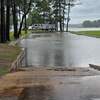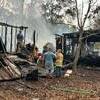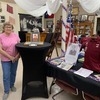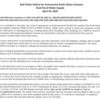Be safe while ringing in the new year
Anyone ringing in the new year with fireworks is urged to do so safely and carefully – to make sure everyone has a good start to 2020.
This holiday season, the Texas A&M Forest Service is urging everyone to be careful when participating in seasonal activities that could start a wildfire or house fire. One spark can ruin a holiday.
“Across the country, the most home fires occur in the months of December and January,” Texas A&M Forest Service Prevention & Mitigation department head Bruce Woods said. “In addition, 10 percent of all firework fires for the year occur from Dec. 30 through Jan. 3. For your safety, it is important that you take the time to follow winter holiday safety tips.”
Firework sales in Texas officially began Friday, Dec. 20 and stands will remain open through midnight of Jan. 1, 2020. Minimum age to purchase fireworks is 16 years. The cities of Alto, Jacksonville and Rusk currently have ordinances prohibiting the use of fireworks within their city limits.
In Rusk, the fines for getting caught using fireworks inside the city limits can be as much as $170.
“Our codes will absolutely be enforced,” Rusk Police Chief Joe Williams said.
According to the National Fire Protection Association (NFPA)’s website, nfpa.org, fireworks start an average of 18,500 fires a year.
Fireworks also cause numerous injuries each year, with burns, lacerations, contusions and foreign matter in the eyes being the most reported.
“In 2015, U.S. hospital emergency rooms treated an estimated 11,900 people for fireworks related injuries; 51 percent of those injuries were to the extremities and 41 percent were to the head,” the NFPA’s website states. “Children younger than 15 years of age accounted for one-quarter (26 percent) of the es-timated 2015 injuries.”
The U.S. Consumer Product Safety Commission (CPSC) offers these fireworks safety tips on its website, cpsc.gov:
• Never allow young children to play with or ignite fireworks.
• Avoid buying fireworks that are packaged in brown paper because this is often a sign that the fireworks were made for professional displays and that they could pose a danger to consumers.
• Always have an adult supervise fireworks activities. Parents don’t realize that young children suffer injuries from spar-klers. Sparklers burn at temperatures of about 2,000 de-grees - hot enough to melt some metals.
• Never place any part of your body directly over a fireworks device when lighting the fuse. Back up to a safe distance immediately after lighting fireworks.
• Never try to re-light or pick up fireworks that have not ig-nited fully.
• Never point or throw fireworks at another person.
• Keep a bucket of water or a garden hose handy in case of fire or other mishap.
• Light fireworks one at a time, then move back quickly.
• Never carry fireworks in a pocket or shoot them off in metal or glass containers.
• After fireworks complete their burning, douse the spent device with plenty of water from a bucket or hose before discarding it to prevent a trash fire.
• Make sure fireworks are legal in your area before buying or using them.
And always remember, fireworks and alcohol do not mix.
“Each New Year’s Eve, consumers are injured because their judgment has been impaired by beer, wine, or other alcoholic drink,” National Council on Fireworks Safety President Nancy Blogin said in a statement published on the website, fireworks-safety.org. “Do not use fireworks after drinking any quantity of alcohol.”
Blogin also implores consumers to not use illegal explosives or professional fireworks. In 2015, she noted that there were seri-ous injuries caused by consumers using illegal explosives and/or professional fireworks. Blogin cautions consumers to only pur-chase legal consumer fireworks from authorized stores or stands, and to never buy fireworks from individuals, or from vendors in back alleys or operating out of their house.
The National Council on Fireworks Safety is a 501(c)(3) charita-ble organization whose sole mission is to educate the public on the safe and responsible use of consumer fireworks.
And don’t forget the family pets during your new year’s celebra-tions.
The Humane Society of the U.S. reports many pets are fright-ened and might try to run away from the loud sounds and sights.
Because animals are more sensitive to loud sounds, flashing lights and strong smells, officials, recommend keeping pets, es-pecially dogs, indoors, even if they usually stay outside.
Please support The Cherokeean Herald by subscribing today!
